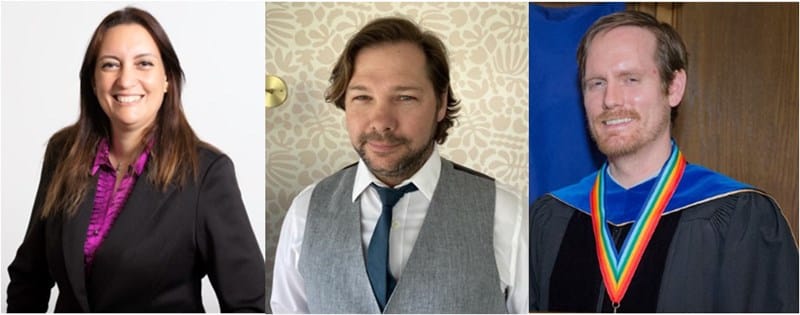The CUR Mathematics and Computer Sciences Division announces the 2021 recipients of its Faculty Mentor Awards, which honor mentors for their success in mentoring undergraduate researchers:

- Rania Hodhod (Columbus State University, mid-career awardee)
- Erik Insko (Florida Gulf Coast University, mid-career awardee)
- Christopher Seaton (Rhodes College, advanced career awardee)
Rania Hodhod, associate professor and assistant chair in the TSYS School of Computer Science at Columbus State University, earned a BS in computer science and pure math and MS in computer and information sciences at Ain Shams University in Egypt, as well as a PhD in computer science from the University of York in the United Kingdom. Her research interests include artificial intelligence, expert systems, serious games, interactive narrative, and computational creativity. Since 2014, she has mentored more than 60 students.
Erik Insko, associate professor in the Department of Mathematics at Florida Gulf Coast University, earned a bachelor’s degree in mathematics from Loras College and master’s and PhD degrees in mathematics from the University of Iowa. His main research interests are in algebraic combinatorics and discrete mathematics. Dr. Insko has mentored more than 47 undergraduates and coauthored 11 publications with undergraduates. A founding co-organizer of the Underrepresented Students in Topology and Algebra Research Symposium—a national research conference for graduate and undergraduate students from underrepresented groups—he believes that positive research experiences can help undergraduates discover the joy of mathematics and empower them to pursue their passions.
Christopher Seaton, professor in the Department of Mathematics and Computer Science at Rhodes College, earned a BA in mathematics from Kalamazoo College and a PhD in mathematics from the University of Colorado at Boulder. His research interests include differential geometry and topology of singular spaces, invariant theory, and symplectic reduction. Promoting research experiences that synthesize techniques from many fields of mathematics to build student skills, Dr. Seaton has coauthored 9 articles with undergraduate students and supervised more than 20 theses of fourth-year students.
Founded in 1978, the Council on Undergraduate Research (CUR) focuses on providing high-quality and collaborative undergraduate research, scholarly, and creative activity. Among the many activities and networking opportunities that CUR provides, the organization also offers support for the professional growth of faculty and administrators through expert-designed institutes, conferences, and a wide-range of volunteer positions. The CUR community, made up of nearly 700 institutions and 13,000 individuals, continues to provide a platform for discussion and other resources related to mentoring, connecting, and creating relationships centered around undergraduate research. CUR’s advocacy efforts are also a large portion of its work as they strive to strengthen support for undergraduate research. Its continued growth in connections with representatives, private foundations, government agencies, and campuses world-wide provides value to its members and gives voice to undergraduate research. CUR is committed to inclusivity and diversity in all of its activities and our community.
CUR focuses on giving a voice to undergraduate research with learning through doing. It provides connections to a multitude of campuses and government agencies, all while promoting networking and professional growth to its community.


